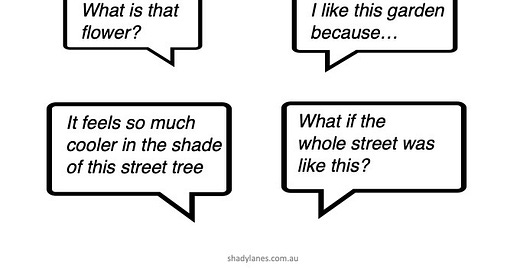Conversations on the Verge - Hope and Despair
Like my chat on the verge, better conversations can bring us together.
Thursday was one of those days when, sitting at my desk, the ideas just wouldn’t flow. Time for a reset. So I went out and pulled some weeds before they set the seed on the verge. Being a weekday and out of dog-walking hours meant few people were about.
I find weeding is a quiet contemplative activity with the bonus that it gives time for observation and being in the space while I work out what plants might survive the gruelling summer ahead in the new verge garden extension. It is much narrower verge than mine, so needs plants of different dimensions to keep out of the way of pedestrians and people alighting from cars parked alongside.
A woman from a few streets down came by and paused for a chat. It was not our first verge-side chat and each time we get to know each other a little better.
We talked about how dry it was already with a hot summer looming. Gradually it moved on to it being likely to be the hottest summer yet and suddenly we were acknowledging climate change without needing to say those words in polite conversation. She was pessimistic - feeling that the economy is what is leading us down this track so there’s nothing we ordinary people can do about it, just get on with life while we can. I said that if anything saves us, it will be biodiversity and that’s why I do what I do.
While our responses may have been different, the conversation ended with an acknowledgement of our shared concerns and acceptance of both responses as valid. Our next conversation will have a different starting point.
I resumed my weeding and started mulling this over.
I know of so much good work that’s going on - the day before I’d been to a presentation put on by the council about how businesses can be part of the circular economy. On Linkedin and other forums, I see people and organisations in many fields determined to bring changes to turn things around, to mitigate, to adapt, to increase biodiversity. There, the doom and gloom is modified into thinking not enough is happening at the speed and scale needed and we have to do more. Yet, for all the talk about collaboration and co-design, the professional worlds and their proposed solutions exclude most of the population and voters.
The majority of people are guided by the mainstream media and social media. The stories they hear from the media, the messages coming from politicians trying to score points and win elections for their team, and continual advertising selling more and more products, encourage short term views and entrenched consumption.
The doom and gloom messages from environmental advocates and protestors may be factual but they offer little hope. Will one signature on a petition or one vote really make a difference? Is it any wonder people tune out and concentrate on day-to-day interests and issues?
If we all move in the direction of our conversations, these siloed conversations are taking us further apart.
Like my chat on the verge, better conversations can bring us together.
It’s through conversations that we build the trust and relationships we need to work together on solutions - across sectors, across disciplines, across political divides, learning to talk with each other and not talk at each other.
Our verges and streetscapes provide a perfect setting to practice those conversations, bringing together people in a neutral shared space where our only obvious connection is that we live in the same street or suburb or city.
To nurture both biodiversity and conversations on the verge, we need to learn to see the space from many perspectives and find the balance between them. The purpose of the free Understanding the Space course is to encourage reflection about the many different uses and users of that little patch of land in front of our homes so we can have better conversations.
Those conversations and the network of people you get to know and trust created in the process of doing your own verge, and taking part in group projects, lay the groundwork for doing much more.
What conversations have you had on the verge or nature strip? How were they different to conversations elsewhere? Do you stop and chat to people gardening in front of their houses? Please let us know in the comments below.





Gayle, i wholeheartedly agree that its the small local conversations, interactions and actions that make all the difference to the quality of our lives. nurturing our verge gardens will increase community, cooperation and wellbeing. We met our Brisbane neighbours 13 years ago through the simple gesture of them mowing our verge strip and then us reciprocating. small goodwill gestures start relationships and increase wellbeing for every one involved. now to convert our shared verge strip to a native garden together. 😀